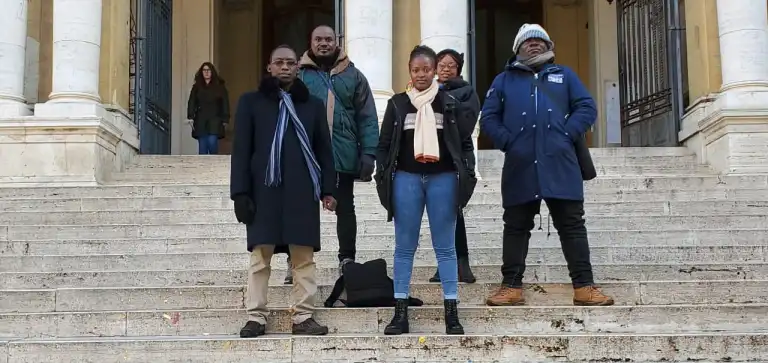By Irene Best Nyapendi
Four Uganda Christian University (UCU) students had a resume-building experience during a one-month internship in Spain and Italy.
Amos Mangeni, Sharon Longora, Agatha Ankunda and Ronald Omugalanda Mayanja, who studied for a one-year, UCU Post Graduate Diploma in Sustainable Business and Renewable Energy in 2022, were chosen from among their class of 10 to travel to the two European countries for a program sponsored by the Erasmus+ Program of the European Union.
The students were at Sapienza University of Rome, Italy, between January 16-27, 2023, and were at the University of Cadiz, Spain, from January 30 to February 10. They returned to Uganda on February 12.

The focus of the visit was renewable energy. Mangeni, Longora, Ankunda and Mayanja observed and learned about how other countries were making strides in clean energy to better prepare them to harness renewable energy in Uganda.
Mangeni shared that he made contacts that promised further collaboration after he left their countries.
“This means a lot to me,” he said. “It was an opportunity to interact with different people from different fields and experiences, new software and machines.”
He was impressed by the technologies.
“I visited a 100kw Solar PV grid connected plant at the University of Cadiz faculty of business in (Andalusia) Spain,” he said. “This PV plant supplies energy to the faculty and the surplus is connected to the grid for sale, especially during the day.”
Mangeni said the university buys electricity from the national grid whenever the need arises. The quadruple got a chance to install a 0.6kw PV grid connected system at the University of Cadiz’s faculty of engineering.
“It was an opportunity not only to learn more about renewable energy, but to network with experts for future collaborations on renewable energy projects to advance the energy transition,” Ankunda concurred.
Ankunda commended the University of Cadiz for giving them access to their laboratories where they did practical experiments on the application of technologies. The tryouts came at the right time for her because she will use the knowledge to train others specific to solar systems, bridging the gender gap, in the Women Renewable Energy Association (WREA) in Uganda.
“I was also intrigued by their enforcement of sustainability approaches whereby most businesses were using recyclable bags and wooden cutlery for restaurants,” Ankunda said. “Wood is environmentally friendly because it can decompose.”
Ankunda and Longora enjoyed field visits to renewable energy project sites One example was the privately-owned hydropower plant in Ascoli, Italy. The power plant in Ascoli is in a mountainous area and taps water from a river that is 45km (27 miles) away. The plant produces hydro energy and feeds it into the grid.
“This hydro power plant is also used for irrigation,” Ankunda said. “They channel water from the river, it is pumped and sent to the farm.”
Uganda’s location at the equator and receiving moderately 6 to 7 hours of sunshine per day is an added reason for communities to shift from hydro power to solar.

Ankunda interacted with a team of professors conducting research on sustainable waste management – an exposure relevant to a similar project in Uganda.
For Mayanja, gaining added knowledge on how to set up a solar system was valuable. “I am forever grateful to God for the answered prayer to be included on the list to go to Italy,” he said.
“I worked with fellow students to connect the solar panels, generate energy and connect the direct current energy to the converter to change it. It is then converted to alternate current energy, then connected to the grid,” he said.
He said that such a project can even be installed at UCU as well as communities that are not connected to the national grid.
Mayanja observed energy-saving practices throughout Spain. One example is polythene bags in the supermarkets with messages of reduce, reuse and recycle, the 3 RS of sustainability. Another lesson came from a session on how hydro and wind energies are generated.


